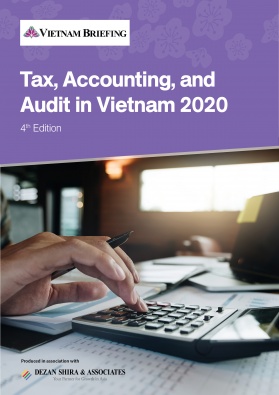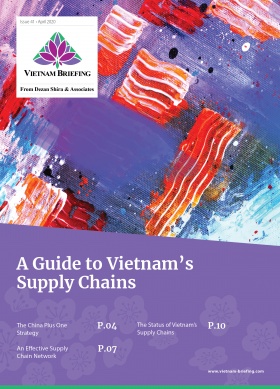Vietnam Adopts Amended Law on Enterprises and Law on Investment
- Vietnam’s National Assembly passed the revised Law on Enterprises and the Law on Investment aimed to make doing business in Vietnam less cumbersome.
- Both laws will take effect on January 1, 2021, and are timely given the passage of the new free trade agreements such as the EVFTA and the CPTPP.
- While the government is likely to issue forthcoming circulars and decrees on implementation, Vietnam Briefing highlights the main points on the revised laws.
On June 17, Vietnam’s National Assembly (NA) passed the amended Law on Investment and Law on Enterprises, both of which will take effect on January 1, 2021.
The amended Law on Enterprises simplifies the business registration process, redefines state-owned enterprise (SOE), and excludes household business from the scope of the current law. The amended Law on Investment provides updates on conditional business lines, investment incentives, support mechanisms while removing administrative approval for certain types of investment projects.
To understand the changes, Vietnam Briefing discusses these key updates in detail:
Changes to the Law on Enterprises
-
Removal of seal specimen
The amended Law on Enterprises removes the procedure to notify the seal specimens, including the carving seal and digital signatures, to the Business Registration Authority (BRA). Additionally, enterprises are allowed to decide on the type, number, form, and content of the seals for its branch, representative offices (ROs) and other units without notifying the BRA.
The requirement on changes to the personal information of a businesses’ manager has also been removed.
-
Separate law for household businesses
Due to the differences between household businesses and enterprises, the NA voted to form a separate law for household business. Until this law is issued, the government will oversee regulations related to household businesses.
-
New definition of SOE
Enterprises with more than 50 percent of the charter capital owned by the State will be considered SOEs as compared to the current ratio of 100 percent. Article 88 of the Law on Enterprises also divides types of SOE according to the different levels of ownership.
-
Protection for minority shareholders
The revised law removes the requirement that a shareholder or a group of shareholders must hold ordinary shares for at least six consecutive months to exercise the rights of shareholders. Moreover, shareholder(s) that own five percent or more of common shares have the following rights:
- Review, search, and extract the minutes’ books and resolution, decisions of the Board of Directors, financial statements, except documents related to trade and business secrets;
- Request a convening of a general meeting of shareholders in some specific cases; and
- Request the Supervisory Board to examine each specific issue related to management and administration when deeming it necessary.
Changes to the Law on Investment
-
Conditional business lines
Among the new changes, the law makes amendments to the list of sectors and business lines requiring conditional market access. Conditional market access are business lines in which the investment must satisfy specific statutory conditions in order to gain market access. Especially, the amended law outlaw’s debt collection services, while abolishing or reducing conditions for 22 business lines, such as commercial arbitration, and franchising and logistics services.
In addition, several sectors have been added to the list that are subject to conditional market access. These are:
- Tobacco detoxification provision services;
- HIV/AIDS treatment;
- Elderly care;
- Water sanitization;
- Architectural services;
- Import press distribution services;
- Electronic identification and authentication services;
- Fishing vessel registration; and
- Fishing vessel crew training, among others.
The law also contemplates a list of business lines restricted to foreign investment. The NA Standing Committee has emphasized the need to balance national security and investment attraction for socio-economic development, especially for coastal and remote areas.
-
Incentives and investment support
To ensure the quality of foreign investment, the amended law includes specific conditions for sectors that are entitled to investment incentives. These include:
- Innovation-related sectors such as Information Technology (IT), R&D, digital content, hi-tech, new and clean energy, and production of intermediate goods participating in value chains and industry clusters, among others;
- To ensure the effectiveness of incentive schemes, maintaining incentives is conditional to the performance of the previous support package. More specifically, the government would set a definite term for incentives and would extend or scrap it in accordance with the outcome of the incentive;
- The Prime Minister can apply special incentives to create a favorable mechanism and policies to attract FDI inflows. Notably, the law allows a maximum discount rate of more than 50 percent compared to the highest level prescribed by the current law; and
- The law also provides special incentives for projects with an investment capital of over VND 3 trillion (USD 128.4 million), and VND 10 trillion (USD 428 million), with certain conditions.
-
Investment procedures
The law removes the need for a Merger and Acquisition (M&A) approval if the transaction does not result in an increase of foreign investors’ ownership ratio in the target company. M&A transactions that result in an increase of foreign investors’ ownership ratio in the target company, and exceeds the 50 percent of shares or charter capital would be subject to an M&A approval.
In addition, projects with an investment capital of VND 10 trillion (US$428 million) will not be required approval from the Prime Minister.
Takeaways
The amended Law on Investment helps resolve overlapping investment-related laws, clarifies the principles and conditions to select investors for projects involving land use, including the auction of land use rights, bidding to select investors, and the approval of investors and investment practices. The amended Law on Enterprises addresses unnecessary administrative procedures, extends the scope of SOE, and entitles minority shareholders with more rights. These changes underline the government’s efforts to further improve Vietnam’s business environment as well as the country’s rankings in the Ease of Doing Business report by the World Bank.
About Us
Vietnam Briefing is produced by Dezan Shira & Associates. The firm assists foreign investors throughout Asia from offices across the world, including in Hanoi and Ho Chi Minh City. Readers may write to vietnam@dezshira.com for more support on doing business in Vietnam.
- Previous Article Guidelines on Vietnam’s Competition Law: Decree 35
- Next Article Vietnam’s Social Insurance Reduction: Decree 58 on Occupational Diseases and Accidents







